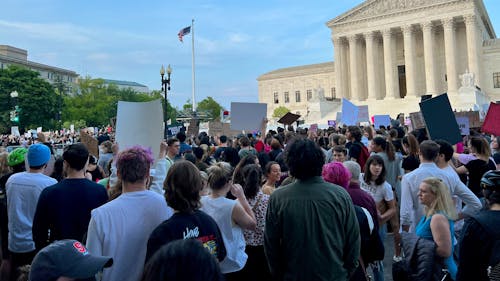SUBRAMANIAN: Decline in free speech on college campuses is alarming
Column: Whadda I Know

"Congress shall make no law respecting an establishment of religion, or prohibiting the free exercise thereof, or abridging the freedom of speech or of the press, or the right of the people peaceably to assemble and to petition the government for a redress of grievances," according to the First Amendment. This idea has been a cornerstone of American society, and people should be able to freely express their ideas.
But in recent years, this has been in decline. From former President Donald J. Trump declaring the press the enemy of the people to book bans that seek to remove literature regarding racial and gender issues in public schools, it is clear that the attacks on free speech are not going to be ending anytime soon. The most prolific place this is happening is in American universities. The number of students who feel the decline of free speech is increasing on campus is growing.
In 2022, the Foundation for Individual Rights and Expression (FIRE) found that approximately 3 out of 5 students said that they would be uncomfortable publicly disagreeing with a professor regarding a controversial topic, and 48 percent of students said that they would be somewhat or very uncomfortable expressing their opinions on controversial political topics during an in-class discussion. These numbers are incredibly worrisome to the state of free speech on campuses.
Looking deeper at college campuses, evidence supports students’ concerns about free speech. In a 2021 FIRE report, 66 percent of students supported shouting speakers down, and 23 percent said it was acceptable to use violence to shut a speaker down. This has become a more common occurrence as well.
In October 2022, students at the University of Wisconsin—Madison vandalized multiple locations on campus after Conservative podcaster and creator of the documentary "What Is a Woman?" Matt Walsh was invited to speak at the campus. Even more recently, on November 11, Conservative commentator Ann Coulter was heckled during a speech that she was giving at Cornell University.
Both Walsh and Coulter certainly have problematic views, especially on LGBTQ+ issues (and I am not endorsing their views), but banning them from speaking on college campuses does not make the repugnant views go away. By letting them speak on campus, people can better understand their views and thus can be better equipped to engage with them in an intellectual free market.
Campus speakers are not the only group that is at risk for the ascendent anti-free speech movement on campus. Student publications have also been the target. For example, in 2019, the Rutgers Conservative Union achieved its goal of defunding The Daily Targum due to the publication having a perceived anti-Conservative bias. This was achieved through a referendum that critics have said is unconstitutional.
Similarly, in 2017, students at Pomona College tried to get the university to take disciplinary action against students writing for The Claremont Independent, a Conservative student-run paper.
These student newspapers serve as places where students can express their opinions on the university and the current state of the world. Attacking these institutions gives students less of a voice to challenge bad practices or express unpopular opinions. Taking away a medium of student expression will do more damage to free speech.
Students are not the only ones at risk of dealing with censorship on college campuses. It has become common practice to attack professors for their actions, usually with terrible ramifications. One prominent example happened in 2015 when students at Yale University pushed for former master of Silliman College Nicholas Christakis and his wife Erika Christakis to resign from the university after students questioned an email regarding Halloween costumes.
Eventually, both ended up resigning citing personal issues, but there is no doubt that this incident either directly or indirectly impacted their decision to leave. In 2017, Bret Weinstein, a professor at Evergreen State College, had to resign due to his opposition to the school's day of absence where white students were asked to leave campus for one day to give space for minority students to talk about race issues.
The goal of universities is to get students to engage in critical thought and discussion. Oftentimes, this means confronting thoughts and ideas that are uncomfortable and at times problematic. Instead of encouraging students to contend with these ideas, the current ecosystem of the American university is one in which silencing speech is considered virtuous and righteous.
To create a healthy, understanding and unified democracy requires people to view others not as enemies but as people who have some disagreements and will engage in healthy dialogues to express their views. Banning those with unpopular views is the equivalent of putting duct tape over a fuel gauge and expecting to drive forever.
Even if you do not agree with these views, they are still going to be out there. Learning to contend with those ideas and improve one’s reasoning skills would significantly help in creating a healthy, diverse and tolerant political system. But hey, whadda I know.
Kiran Subramanian is a junior in the School of Arts and Sciences majoring in economics and political science. His column, "Whadda I Know," runs on alternate Tuesdays.
*Columns, cartoons and letters do not necessarily reflect the views of the Targum Publishing Company or its staff.
YOUR VOICE | The Daily Targum welcomes submissions from all readers. Due to space limitations in our print newspaper, letters to the editor must not exceed 900 words. Guest columns and commentaries must be between 700 and 900 words. All authors must include their name, phone number, class year and college affiliation or department to be considered for publication. Please submit via email to oped@dailytargum.com by 4 p.m. to be considered for the following day’s publication. Columns, cartoons and letters do not necessarily reflect the views of the Targum Publishing Company or its staff.



